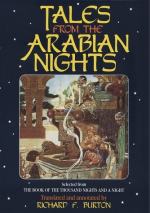[FN#117] The phrase, I have noted, is not merely pleonastic: it emphasises the assertion that it was a chance day.
[FN#118] An old Plinian fable long current throughout the East. It is the Pers. Nim-chihreh, and the Arab Shikk and possibly Nasnas=nisf al-Nas (?) See vol. v. 333. Shikk had received from Allah only half the form of a man, and his rival diviner Satih was a shapeless man of flesh without limbs. They lived in the days of a woman named Tarifah, daughter of Al-Khayr al-Himyari and wife of Amru bin ’Amir who was famous for having intercourse with the Jann. When about to die she sent for the two, on account of their deformity and the influence exercised upon them by the demons; and, having spat into their mouths, bequeathed to them her Jinni, after which she departed life and was buried at Al-Johfah. Presently they became noted soothsayers; Shikk had issue but Satih none; they lived 300 (some say 600) years, and both died shortly before the birth of the Prophet concerning whom they prophesied. When the Tobba of Al-Yaman dreamed that a dove flew from a holy place and settled in the Tihamah (lowland-seaboard) of Meccah, Satih interpreted it to signify that a Prophet would arise to destroy idols and to teach the best of faiths. The two also predicted (according to Tabari) to Al-Rabi’ah, son of Nasr, a Jewish king of Al-yaman, that the Habash (Abyssinians) should conquer the country, govern it, and be expelled, and after this a Prophet should arise amongst the Arabs and bring a new religion which all should embrace and which should endure until Doomsday. Compare this with the divining damsel in Acts xvi. 16-18.
[FN#119] Arab. “Kahramanah;” the word has before been explained as a nurse, a duenna, an Amazon guarding the Harem. According to C. de Perceval (pere) it was also the title given by the Abbasides to the Governess of the Serraglio.
[FN#120] So in the Apocrypha ("Tobias” vi. 8). Tobit is taught by the Archangel Raphael to drive away evil spirits (or devils) by the smoke of a bit of fish’s heart. The practice may date from the earliest days when “Evil Spirits” were created by man. In India, when Europeans deride the existence of Jinns and Rakshasas, and declare that they never saw one, the people receive this information with a smile which means only, “I should think not! you and yours are worse than any of our devils.”
[FN#121] An Inquisitorial costume called in the text “Shamiyat bi al-Nar.”
[FN#122] A tribe of the Jinn sometimes made synonymous with “Marid” and at other times contrasted with these rebels, as in the Story of Ma’aruf and J. Scott’s “History of the Sultan of Hind” (vol. vi. 195). For another note see The Nights, iv. 88.
[FN#123] Arab. “’Ilm al-Huruf,” not to be confounded with the “’Ilm al-Jumal,” or “Hisab Al-Jumal,” a notation by numerical values of the alphabet. See Lumsden’s Grammar of the Persian Language, i. 37.
[FN#124] Like our “Cut your mutton,” or manger la soupe or die suppe einzunehmen. For this formula meaning like the Brazilian “cup of water,” a grand feast, see vol. vii. 168.




